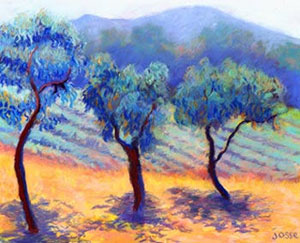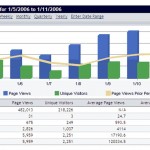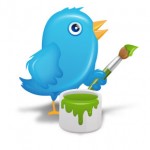We’ve been having another big discussion at Art Marketing Secrets recently – this time about the whole issue of stealing images from artist websites. While we all know that it’s true that this is a fact of life, the big question is: Does it really matter? Will it significantly change your art career if someone downloads and re-uses an image from your website?
At first it’s tempting to go for the obvious answer – OF COURSE it matters! It’s just plain wrong to steal work from a website and to re-use it without permission – especially for commercial purposes. And those images could be used to make prints and art-cards, and could be licensed out to make all manner of things like coffee mugs and tea pot stands.
But is there a real risk of that?
On the other side of the fence one could argue: What can anyone seriously do with a small 72 dpi image? It’s not print quality so it’s not like it is going to be published as an expensive giclee image for example. And in some cases it misses an important point:
What if in making your images completely safe you make it more difficult for galleries and collectors to use your website? That would be like shooting yourself in the foot – right?
One example of this is the popular mouse-over image galleries where you can’t actually see an enlargement of a thumbnail image unless your mouse is hovering over the thumbnail. It probably protects your art but anyone seriously interested in your work is going to have their patience extremely tested – and that’s not really worth considering if you hope to sell some art or “be found”!
You can also add digital watermarks to your images, but in our experience they tend to look unsightly and take away from the quality of the viewing experience. This might be OK if you are focused in a very low-cost art-print market space, but if you’re into promoting your high-end originals we have yet to see a site that looks good with watermarked images.
Some of the do-it-yourself online portfolio services offer image protection as part of their service, but it is far from foolproof. Want to know why? I just tested two of them and was impressed at first that I was not able to right-click and download the image on the screen. But then I remembered the “Grab” application on my Mac – and in a few moments I had successfully copied images from both services – glad that I wasn’t paying them for that feature!
So, there you have it. We haven’t yet seen a fool-proof solution for protecting art online and at 72 dpi, we’re not sure that it actually does matter. There’s an age-old concept that wherever you put your attention, there you go…. Based on that, our honest feeling as we write today is that you should probably spend more time thinking about and planning how to get the RIGHT people to see your website than worrying about how to keep the wrong people away!
That’s our view and it’s always subject to change if we learn something new. What do YOU think about this? Please comment below – we really want to hear what you have to say!



The other artistic industries like music are starting to accept the fact that they can't totally protect their work online and beginning to find new ways to deal with that. There is a general feeling amongst some musicians that if they just get their work out there, the fans will find them and their work will be recognised and the money will come as a result of that.
After all if someone is copying your work they obviously like what you are doing and in a way are helping to promote you! No one likes the idea of having their work stolen, however, the person who is going to purchase low quality copies of images isn't the same person who is going to appreciate an original piece of unique artwork.
I have to agree with you. People steel images off the web all the time. Do I like it? No. Do I encourage it? No. But I'm not going to spend my time fighting some illusive amorphous villain. I'd rather spend my time creating. Thanks for the post.
One of the simplest things to suggest here, is to actually put 72dpi images online… I have seen sites with artwork of full images whith much higher resultion, so artists sometime forget (or are not aware) of this simple thing they got to do.
Also, if the image is in high resultion, even if it uses some tricks to disable downloading, screen capturing or grabbing will not do the trick to get the full resolution, but if you know HTML, then viewing the source code will quite easily show you were to look for the original image…
I have talked in the past with a high-end Judaica designer, who sells his work for tens of thousands of dollars. His problem is not that people download his images, but competitor designers are copying his design ideas and making them and selling them for cheap. Similar to John Unger issue recently… So my friend actually have less than 5 design on his site… but this makes his site very thin and doesn't show his entire collection or how talented he is!
Another approach that licensing artists are taking is to show only few examples, and then if someone is interested, they have to approach them and get a password. So the rest of the collection is password protected. I don't think this will ever work for selling art online… For licensing portfolio, maybe.
For awhile I was only putting small images on my site because of this, but, I now decided that it wasn't worth it. I just don't feel concerned about this. I think there are very few companies who would outright steal your images and use them on products. The ones that do not have the ethics and do such things would probably also have bad lawyers, so would be easy to sue. I have way too many other things to do.
I have CopyRightPro (WordPress plug-in) installed which prevents right clicking and a couple other image stealing methods. People can screen grab, but the image suffers in a screen grab.
I also have all the meta-data in most of my images chock full of copyright information. My optimistic self thinks anyone who sees that will think three times before reproducing without rights. You can easily edit your picture's metadata in Adobe Bridge.
The newest Adobe Bridge has a wondrous feature where you can edit metadata for hundreds of pictures all at once.
As far as what I learned, adding keywords to your actual images helps when someone does an image search and adds to the chances that people will find your site and buy your wondrous art.
Hi Christine, Moshe, Latifah, and Rebecca,
Thanks a lot for your very well thought through comments which added a lot of useful info to the post. This is what good community is all about!
Daniel.
i think that if people are going to take art off your website and use it for something it is free publicity! and like they were saying, it would probably be printed on low quality anyways. if they tried to enlarge it through photoshop the jpg which was saved at 50% to 40% resolution would completely pixalate. the only thing that i have seen that can get around something like that is specialized satellite photo restoration software which costs about $10,000 to $20,000 just to get access to that kind of technology. there is also another way, you can take a text file with your name, copy right info, web address and such, and embed the text file into the image where the second file is hidden in the pic on your website. this is called steganogrophy. here is the wikipedia page…
http://en.wikipedia.org/wiki/Steganography its another way of protecting your work.
just an FYI.
p.s. here is a website the helps you embed the text…
http://utilitymill.com/utility/Steganography_Enco…
The more people that take my husband's art images off of our website, the happier I am. That's because I know that the art is being spread out there virally. And most people on the web know that if they "borrow" an image for their blog post or slide show or whatever, that it's only polite to include a link or reference to the artist.
This is what virally spreads your art to people who otherwise might not see it.
Now, if a company takes the art, makes prints of it and sells it, that's a problem. We've had that happen a couple times, and promptly put an an end to it with a cease and desist through our attorneys.
I'm all for sharing the images for non-commercial use. It benefits everyone.
Luke, Thanks for that info – that is very helpful!
Maria – great insightful comment – thanks 🙂
I tend to take a different mindset to this subject. I prefer to take an abundance mentality and freely give them away. Why Not? I find that if I am busy trying to horde my work then I am missing opportunities to broaden my circle of influence. What if we as artist give our digital format work away? There is no production cost to us for this format!
Seth Godin gives away his books in pdf format then he goes about selling millions of copies of the physical book! Why is that? People want to have something physical that they can hold in their hand or, in my case, hang on their wall. If they like it then they will buy!
If they are the type that will print out a copy of a file from my site to hang on their wall or put in something they are selling…they would not have bought my work anyway. So why fight it? I figure the more people that see my work, the better the chance of one wanting to actually purchase it! Just my weird way of looking at this!
What are your thoughts?
Brandon
020910
You have offered an interesting comment here and the discussion is very interesting and helpful, especially links to sites with instructions on how to protect your art from theft.
I personally would not mind other people using my images on the web as long as they courteously credit me and include a contact link to a site or blog. That offers broader exposure of my work. And blogs like yours and mine give away useful written material all the time.
I would only include someone elses art or writing if it was relevant to the topic I am blogging about. I would not use another person’s writing or artwork without permission, and would of course attribute the work to them, and link them as well, if they desired. The idea that someone would market another person’s art as their own on saleable products is creepy.
Hi, the comments that regard "stealing" as good free publicity forget the fact that, very often the person who feels entitled to download artwork for nothing has very little interest in the actual artist.
Hi all, I would be delighted to see someone using my art on their website. However, my question is to photographers. How do you feel if an artist uses your photograph as a photo-reference for their painting? As a painter myself, I'm always on the lookout for good photo-references, but am very careful when it comes to copyright issues.
So, photographers, what say you??
Great article! Does it really matter? You bet it does! I wholeheartedly agree with those here who consider it further publicity, and I know first-hand that it can and occasionally does go viral. This is the best possible outcome for such 'theft', but it does indeed happen.
In March 2008 such a thing happened to me. Someone visited my website, liked the images, and instead of simply emailing a link to friends the person instead took nearly 20 images and emailed them to a handful of friends. No name, no url, no credit whatsoever. That email went viral and went global in just a few weeks. At the height of it I was receiving over 700 hits a day from people Googling to find out where they came from. It has since been blogged in over 48 countries that I am aware of, and there has been printed press in a few countries as well.
Would it have been better and more effective if the person had included my name? Oh, most likely so. But the 'mystery' led quite a few to think that the images were fake. So many people thought them fake that Hoax Slayer in Brisbane investigated me. I still get webhits daily from Hoax Slayer by surfers investigating the Painted Feather hoax. Here is a link to the very nice article they wrote:
http://www.hoax-slayer.com/painted-feather-images…
Art 'theft' from my website without my permission has seriously grown my business in ways I never dreamed possible, and I am grateful to that unknown 'borrower'.
cheers,
~Julie~
the Featherlady
Maybe in the new digital age things will be copied well. I've had BAD experiences with my art being copied so badly that I was ashamed of it, yet well enough that people really thought it was mine. It appeared on tacky t-shirts, and then thousands of paper mache trays. Also applied to barettes and pins. That was a mess. So, personally, every time I've been copied for what was a licensing sort of situation, it's been a nightmare. Oh, and a black and white dog was ripped from a huge collector's catalog and used as a business logo for a fish shop in the UK. Good copies= ok. Poor copies= damaging in my opinion.
These days, Art theft from ones website is just plain stealing in my book – and if anyone thinks differently.
This is what would maybe happen to them in some countries. #1 – Tie this person to the top of a fire-ant hill for about a day. After this do you really think they would do it again? I don't think so. #2. – Cane this person some fifty times. I think this would do the trick. Does all this seem too extreme to root out a problem thats gotten out of hand? Any artist out there that has worked for so many years to be one of the best, as an artist or writer – that has had their works copyed at one time or another, should not ever accept it as, oh well, its just a fact of life – have to live with it. There is a line that has become the norm by so many in this Country. "As long as it happens to someone else, but not me personally. Not physically anyway. "Then its somewhat ok." Some where in all this, as artist we all have to come together as one, at least try and do something about it. Will this ever happen? Not in a million years. So many of us are just to nice. Many in the artist world think that the way to ones heart, is to be pleasing with words. I'm not going to cut corners, but make my thoughts known by these comments that may or may not get through a dummy or two that stealing artist images is just not socially acceptable. There may be others that think its a form of terrorism: (To control or dominate through online intimidation)could be another way of looking at it. Maybe someday. In a new life, a new world, all this will change. Lets hope so.